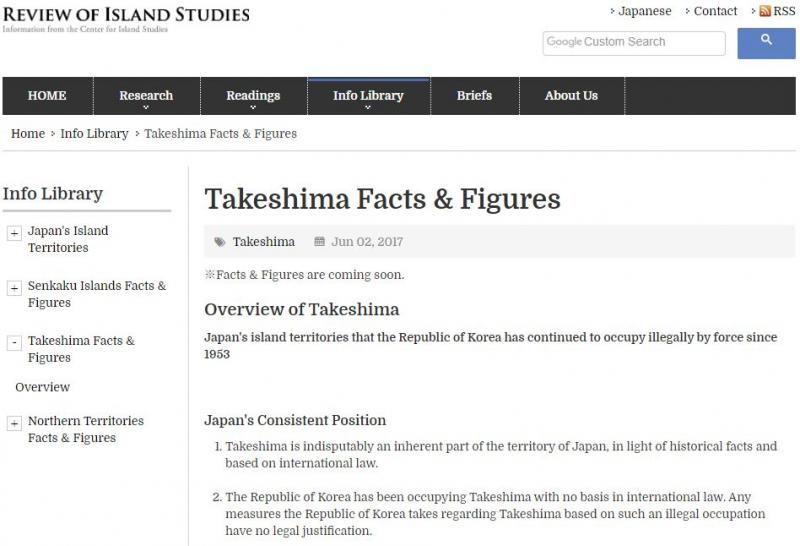 작성일 : 20-09-11 18:07
작성일 : 20-09-11 18:07
|
글쓴이 :
동덕여고이서연
 조회 : 1,901
|
|
Improper designation of Dokdo Island
|
 |
|
| 서한 |
시정서한 |
|
| 매체 |
웹사이트
|
|
| 이슈 |
|
|
| 언어 |
영어
|
|
| 서한보내는곳 |
https://japan-forward.com/contact-us/ |
|
| 오류내용 |
오류 내용 독도를 Takashima 으로 표기함 |
|
| E-mail / Contact |
ashleylsylee@gmail.com |
|
서론 |

To Whom It May Concern:
I visited your website https://japan-forward.com/crowdfunding-launched-for-english-version-of-picture-book-on-takeshima-islands/ and was deeply distressed to find that you have chosen to designate the Islet of Dokdo, an integral part of Korean territory historically, geographically and under international law, as ‘Takashima.” This is a gross oversite and we ask that you rectify this immediately.
It seems extremely inappropriate and frankly
appalling, that an article of this nature could be submitted knowing the
dispute between the two countries and that your site would be so ill informed
to blatantly use of such designation with complete lack of regard for the
dispute between the two countries. The islands symbolizes the lingering historical grievances
between the two nations, which have their roots in Japan's lengthy colonization
of Korea. Your site should educate not spread
misinformation.
|
|
| 본론 |
Using the proper name of Dokdo for the islands between
Korea and Japan is not simply a question of naming a geographic area, but is
part of a national effort by the Korean Republic to erase the legacy of
Japanese Imperialism and to redress the unfairness that has been resulted from that
period. The way African-Americans were enslaved, so was the Korean people.
To give you a
little history, the islands have been a part of Korea as far back as 512 A.D. when
the Usan-guk (Ulleungdo and Dokdo) was conquered by Ichan Isabu, and subjugated
to Silla. This is how Ulleungdo and Dokdo first became Korean territory. It is
recorded in the Reference Compilation of Documents of Korea (1770), that
“Ulleung [Ulleungdo] and Usan [Dokdo] are both territories of Usan-guk.
In 1877, even in the The Dajōkan Order, an order given by the Dajōkan, the highest
administrative body of Japan at the time, to the Japanese Ministry of Home Affairs,
confirming that Ulleungdo and Dokdo were islands outside of Japan’s territory.
As a result of consultations with the government of Joseon (regarding the
Ulleungdo Dispute), the Dajōkan concluded that Ulleungdo and Dokdo did not
belong to Japan, and ordered the Japanese Ministry of Home Affairs as follows:
“Regarding Takeshima [Ulleungdo] and one other island [Dokdo] about which an
inquiry was submitted, bear in mind that our country [Japan] has nothing to do
with them.” It wasn’t until 1905, The Shimane Prefecture Public
Notice No. 40, that a regional
notice announcing the incorporation of Dokdo into Japanese territory. Japan had
been at war with Russia over its interests in Manchuria and the Korean
peninsula since 1904, and needed the island to meet its military needs in the
face of possible maritime clashes with Russia in the East Sea. Japan thus
attempted to incorporate Dokdo in 1905 through this notice, claiming that the
island was terra nullius. However, this was considered much of a internal memorandum
and was not recognized internationally.
But, Most importantly, in the 1951 Conclusion of the Treaty of Peace with Japan, the treaty which the Allied Powers concluded
with Japan at the close of World War II. Article 2(a) provides that “Japan
recognizing the independence of Korea, renounces all right title and claim to
Korea, including the islands of Quelpart, Port Hamilton and Dagelet.” Among
Korea’s approximately 3,000 islands.
Therefore, I urge you to use 'Dokdo Island' to
describe the islands in question in your contents and maps.
|
|
| 결론 |
While the world is ravaged by not only by
Covid-19, but racial injustice and discrimination, I feel that your company
should do the right thing. I ask that you contact me with changes and look
forward to visiting your site with the implemented change. You can email me
at ashleylsylee@gmail.com with
your response, it would be greatly appreciated. Thank you. And I look forward
to hearing from you soon.
Sincerely,
Ashley Lee |
|

